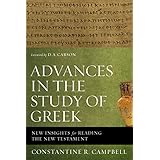Advances in the Study of Greek: New Insights for Reading the New Testament
Grand Rapids, MI: Zondervan, 2015.
Available at Amazon.com
Time to get your Greek geek on cause there are two great books out about the study of NT Greek.
The first is by my friend and TEDS professor Con Campbell. He’s an Aussie, so you know he’s cool and always correct.
This is a great book that should be mandatory reading for anyone who teaches Greek and required reading for anyone doing taking Greek exegesis classes. Campbell does a great job of showing what are the recent and cutting edge views in the study of languages, especially NT Greek, and why you need to know about it! Campbell deals with ten basic areas including (1) A short history of Greek studies; (2) Linguistic theories; (3) Lexical semantics and lexicography; (4) Deponency and the middle voice; (5) Verbal aspect and aktionsart; (6) Idolect, genre, and register; (7-8) Discourse analysis; (9) Pronunciation; and (10) Teaching and learning Greek!
Main things I took away were:
– We need to know more than grammar (learning content, vocabulary and paradigms, or how a language works) but also about linguistics (the theory of language or how languages work).
– We all need to check out the Encyclopedia of Ancient Greek Language and Linguistics (Leiden: Brill, 2014).
– Long live systematic functional linguistics, a way of learning about how a language is used and informs us about its structures.
– Don’t trust a lexicon that uses glosses rather than definitions!
– BDAG and L&N are not perfect, but probably the best lexicons around.
– Deponency died the same year that Tony Curtis did (2010), but passive deponents are still a curious problem.
– Verbal aspect refers to point of view (perfective or imprefective) while Aktionsart refers to what type of action (iterative, ingressive, etc.)
– Porter and Campbell agree that Greek verbs do not encode tense-forms, temporality is more a function of context.
– Is the perfect tense perfective, stative, or temporal? See the volume: D.A. Carson (ed.), The Perfect Volume: Critical Discussion fo the Semantics of the Greek Perfect Tense under Aspect Theory (SBG; New York: Peter Lang, forthcoming).
– Discourse analysis, it is all about the paragraph people!
– In pronunciation, Erasmus sat on a throne of lies: B is really a “v” and X can be a “h” or “ch”.
– Knowing how to properly pronounce Greek is important … as long as you are seeking ordination in the Greek Orthodox church.
– Try use technology when you teach Greek since technology (esp. Bible Software) is now a big part of how people use Greek.
– Richard Gibson and Con Campbell should write a Greek grammar.
I loved this final quote from Con:
Greek cannot be regarded as a peripheral issues for New Testament studies, since the entire New Testament is written in Greek. This means that New Testament studies can no longer afford to hold Greek scholarship at arm’s length, for there is no area of New Testament interest that does not involve Greek in some capacity. It affects the entire guild. This is fact; the only question is whether or not we will be responsible with that fact. For bad Greek is like a poisoned water stream it a village; its ill effects touch everyone (p. 225).
If you are serious about Greek then you really should seriously read this book!











